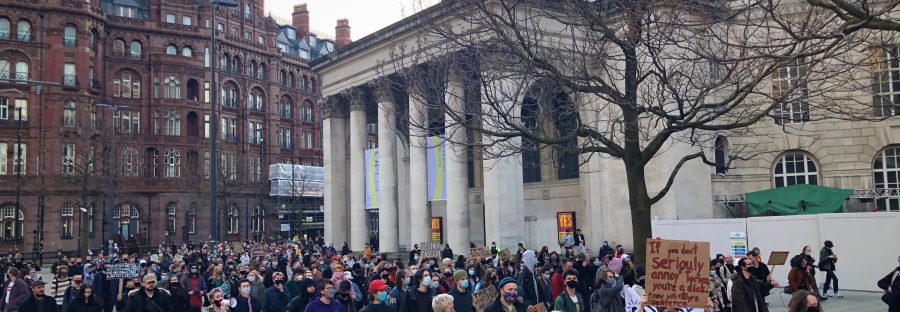Manchester demonstrators protest over police crime sentencing and courts bill
- Protestors express concerns over police corruption and threats to freedom of expression
- Bill proposes stricter protest laws and increase of police power
- Damage to memorials could result in 10 years in prison
Hundreds marched through central Manchester protesting over proposed increased police power and diminished freedom of expression threatened by the police, crime, sentencing and courts bill.
Protestors gathered to challenge the bill proposing increase of police power and changes to protest laws, following the death of Sarah Everard.
Criticised as an anti-democratic bill by human rights charities, demonstrators expressed concern over the right to protest.
Video footage by Victoria Thiele
He said: “I’m here because I think what’s taking place at the moment, is a massive assault on the people’s democratic rights to express themselves, to assemble, to protest injustice.
“I think that’s been brought into sharp believe by the way the Metropolitan Police acted at Clapham Common over the weekend.”
Footage from the vigil has sparked national debate regarding violence towards women, highlighting police maltreatment of the public and the ambiguity of rules concerning public demonstrations.

Martin said he felt apprehensive about how the bill would affect many people in society and states the importance of protesting to promote change.
“Protest changes things; it won us the right to vote, it’s how it got civil rights in the states, it’s how we’ve got the right to form trade unions, it’s how we got environmental legislation,” he said.
Protest speeches were held by members of the public who all echoed worries about alleged police corruption and misuse of power, which many fear could be exacerbated under the new bill.

Last week Priti Patel announced the bill on Twitter, outlining government aims to crackdown on crime by increasing police authority and punishment.
The bill also defines protest rules believed to help manage peaceful protest and enable stronger police action to tackle behaviour deemed as disruptive.
Police will have greater power to control a wider range of protests, such as noise restrictions and apply start and finish times on static protests.
The bill also recommends implementing a statutory offence of public nuisance, intended to tackle any protest tactics deemed to threaten and/or obstruct the life, comfort and space of members of the public.
In addition, damages to memorials include fines of over £2k and maximum punishment of 10 years imprisonment, following the topple of the Edward Colston statue during a BLM protest in Bristol last year.
Individuals who fail to follow protest rules can face punishment on the grounds of whether the person “knows or ought to have known” about the restrictions, despite not being made aware directly by police.


